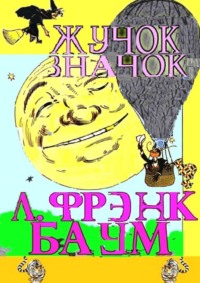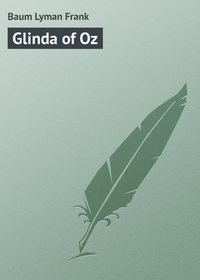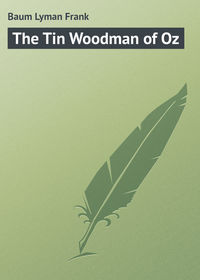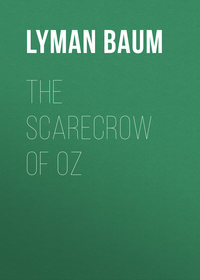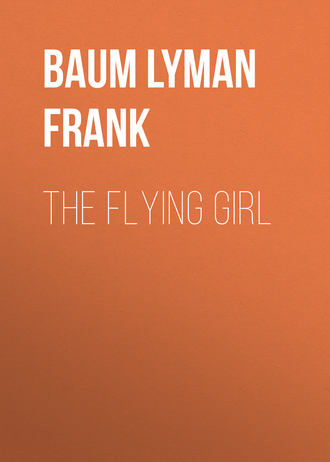 полная версия
полная версияThe Flying Girl
This verdict coincided well with Orissa’s own observations and she accepted it as veritable. Yet Sybil was a constant enigma to her and seldom could she understand the impulses that dominated her. The girl was mysterious in many ways. She saw everything and everyone without looking directly at them; she found hidden meanings in the most simple and innocent phrases; always she seemed suspecting an underlying motive in each careless action, and Orissa was often uneasy at Sybil’s implied suggestion that she was not sincere. The girl would be cold and silent for days together; then suddenly become animated and voluble – a mood that suited her much better than the first. Steve said to his sister: “You may always expect the unexpected of Sybil.” Which proved he had also been studying this peculiar girl.
CHAPTER XV
A FINAL TEST
It was the morning of the tenth of December that the eager little group assembled at dawn on Marston’s pasture to witness the test of the Kane Aircraft.
Steve was so occupied with his final adjustments and anxiety lest he should overlook some important point, that he never thought of danger. He would not have remembered even his goggles had not Orissa handed them to him and told him to put them on.
This was the first time Mr. Cumberford had witnessed a performance of the aëroplane, yet he was much less excited than his daughter, who could not withdraw her gaze from the device and was nervously attentive to every move that the young aviator made. Orissa, confident of the result, was most composed of all.
When all was ready Steve took his seat, started the motors, and when they had acquired full speed threw in the clutch. The aëroplane ran less than fifty feet on its wheels before it began to rise, when it steadily soared into the air and mounted to an elevation of several hundred feet. By this time the aviator, who had kept a straight course, was half a dozen miles from the starting point; but now he made a wide circle and, returning, passed over Marston’s pasture at the same high altitude.
The speed of the aircraft was marvelous. Mr. Cumberford declared it was making a mile a minute, which estimate was probably correct. After circling for a while Steve descended to a hundred feet in a straight dive, holding the device in perfect control and maintaining at all times an exact balance. At a hundred feet he tested the rudders thoroughly, proving he could alter his course at will, make sharp turns and circle in a remarkably small space. Then, having been in the air twenty-seven minutes by the watch, he descended to the ground, rolled a hundred feet on his running gear and came to a halt a few paces away from the silent, fascinated group of watchers.
Not a hitch had occurred. The Kane Aircraft was as perfect a creation as its inventor had planned it to be.
Orissa gave Steve a kiss when he alighted, but said not a word. Sybil impulsively seized the aviator’s hands and pressed them until he flushed red. Mr. Cumberford lighted a fresh cigarette, nodded approvingly and said:
“All right, Steve. It – interests me.”
“It almost seemed alive,” remarked Steve, with pardonable exuberance. “Why, I believe it would fly bottom-side-up, if I asked it to!”
“Any changes necessary?” inquired Mr. Cumberford.
“Only one or two, and those unimportant. The steering-wheel is too loose and needs tightening. The left guy-wires are a bit too taut and need to be relieved. Half an hour’s tinkering and the aircraft will be as perfect as I know how to make it.”
As they were wheeling it back to the hangar, Sybil asked:
“Weren’t you frightened, Mr. Kane, when you were so high above the earth?”
“Oh, no; it is far safer a mile up than it is fifty or a hundred feet. There are no dangerous air currents to contend with and the machine glides more smoothly the more air it has underneath it. When I am near the earth I sometimes get a little nervous, but never when I’m far up.”
“But suppose you should fall from that distance?”
“Fall? Oh, but you can’t fall very easily with this sort of a biplane. At any angle it’s a kind of a parachute, you know, for the hinged ends automatically spread themselves against the air pressure. And as for a tumble, you know that a fall of fifty feet would kill one as surely as a fall of several hundred feet. If a fellow can manage to stick to his aëroplane he’s pretty safe.”
“It seems such a frail thing,” observed Sybil, musingly.
“Just wooden ribs and canvas,” laughed Steve; “but anything stronger would be unnecessary, and therefore foolish.”
“Now, then,” said Mr. Cumberford, when the aircraft rested once more upon its rack, “I’ve something to tell you, Kane. I’ve known it for several days, but refrained from speaking until you had made your trial.”
There was an ominous suggestion in the words. Steve turned and looked at him questioningly.
“Any bad news, sir?”
“Time will determine if it’s bad or good. Anyhow, it’s news. Burthon is building an aircraft.”
“An aëroplane?”
“I said an aircraft.”
“But that word designates only my own machine.”
“Burthon is building your machine.”
Steve stared at him, doubtful if he heard aright. Orissa stood motionless, growing white and red by turns. Sybil’s lips curled in a sneer as she said:
“My clever uncle! What a resourceful man he is.”
“I – I don’t believe I understand,” stammered Steve.
“It’s simple enough,” replied Cumberford. “Burthon sent to Washington for copies of your plans and specifications, has built a hangar and workshop over South Pasadena way, and employed a clever mechanic from Cleveland to superintend the construction – already well under way.”
“How do you know this, sir?” inquired Steve, breathless.
“The clever mechanic from Cleveland is my own man, who has been my confidential agent for years.”
“And you permit him to do this work!” cried the young man, indignantly.
“To be sure. If Brewster loses the job, some one will get it who is not my agent. It is the only way I can keep accurate account of what Burthon is up to.”
They were all silent for a time while they considered this startling information. By and by Cumberford said:
“Burthon has joined the Aëro Club, has donated a handsome cup for the best endurance flight during the coming meet at Dominguez, and in some way has made himself so popular with the officials that he has been appointed a member of the committee on arrangements. I dropped in at the Club yesterday, for I’m a member, and made this discovery. My scheming brother-in-law has some dusky, deep laid plan, and is carrying it out with particular attention to detail.”
“Do you think it concerns us, sir?” asked Orissa, anxiously.
“Yes. It isn’t extraordinary that Burthon should take a fancy to aviation. He is full of fads and fancies, and such a thing is liable to interest him. It interests me. But the meat in the nut is the fact that he is building a copy of the Kane Aircraft, merely adding a few details which he will declare are improvements.”
“Can’t we issue an injunction and stop him?” asked Steve.
“I’ve seen a lawyer about that. We can’t prove infringement at this stage of the game and it would be folly to attempt it. Burthon’s plan is to exhibit his machine first, then keep yours off the field during the meet and afterward claim that you are infringing upon his rights. He has organized a stock company, keeping most of the stock himself, has entered his device in all the aviation tournaments throughout the country, and is issuing a circular offering the machines for sale. I have a hand proof, fresh from the printer, of this circular.”
“Who will be his aviator?” asked Steve, with puckered brows.
“His former chauffeur, Mr. Totham Tyler, is one. He is now looking for another, also.”
Steve drew a long breath.
“What can we do?” he asked in a bewildered tone.
“Checkmate him,” was the composed reply.
“How, sir?”
“Well, we know pretty well all Burthon’s plans. He doesn’t suspect we know a thing; believes he will be able to keep his secret until his aëroplane is ready and he can announce it in the newspapers and create a sensation. He has concocted a very pretty trick. Until this date no one has ever heard of the Kane Aircraft. After the Burthon Improved Biplane is exploited and its praise on every tongue, you won’t be able to get even a hearing with your invention, much less a chance to fly it.”
Steve sat down and covered his face with his hands. His attitude was one of despair.
“When will Mr. Burthon’s machine be finished?” asked Orissa, thoughtfully.
“He expects to make the first trial a week from to-morrow. He has kept a force of expert men at work, and they haven’t attempted to make the Kane engines, but are using a type that has worked successfully in many biplanes. So his machine has grown into existence very quickly.”
“A week from to-morrow,” repeated Orissa, softly. “And Steve is ready to-day.”
Steve looked up quickly. Sybil laughed at him.
“You silly boy,” said she. “Can’t you understand what Daddy means by a checkmate?”
Steve turned to Mr. Cumberford, who was lighting a fresh cigarette.
“If you will place the matter in my hands,” said that gentleman, “I will proceed to put a spoke in Burthon’s wheel, so to speak. Heretofore, Steve, I have been a mere onlooker, a – an interested friend, I may say. At this juncture you’d better make me your manager.”
“Would you accept the position?” asked the boy.
“Yes; there isn’t much else to interest me just now, and – I hate Burthon.”
“Poor uncle!” sighed Sybil.
“On what terms will you undertake this, sir?” Steve inquired, with anxiety.
“Why, I may have to spend a lot of money; probably will; and my time’s valuable; when I’m not here I’m moping at the Alexandria Hotel; so I propose you give me ten per cent of your profits for the first three years.”
“That is absurd, sir,” declared Steve. “There will be little profit at first, and ten per cent of it wouldn’t amount to anything.”
Mr. Cumberford smiled – a grim smile that was one of his peculiarities.
“It’ll do, Steve. I’ll make it pay me well, see if I don’t. But you may add to the demand, if you like, by promising to present my daughter the fourth complete Kane Aircraft your factory turns out.”
“The first!” cried Steve.
“No, the fourth. We want the first three to go where they’ll advertise us. Is it a bargain, Mr. Kane?”
Steve grasped his hand.
“Of course, sir,” he replied gratefully. “I’m not sure we can defeat Mr. Burthon’s conspiracy, but I know you will do all that is possible. And thank you, sir,” he added, again pressing the elder man’s hand.
Orissa took Mr. Cumberford’s hand next. She did not express her gratitude in words, but the man understood her and to hide his embarrassment began to search for his cigarette case. As for Sybil, she regarded the scene with an amused smile, and there was a queer look in her dark eyes.
“Now,” said Orissa, “let us go in to breakfast. You must all be nearly famished.”
“Yes; let us eat, so that I can get back to town,” agreed Mr. Cumberford, cheerfully. “The campaign begins this very morning, and it may take a few people by surprise. Remember, Steve, you’re to stand ready to carry out any plans your manager makes.”
“I understand, sir.”
CHAPTER XVI
THE OPENING GUN
Sybil rode with her father into town. On the way she said:
“You puzzle me. One would imagine you are playing fair with the Kanes.”
“Mere imagination,” he returned, gruffly.
“Yes,” she agreed; “your nature is to plot and intrigue. The deeper, the more stealthy and unsuspected the plot, the more characteristic is it of my subtle parent.”
“True,” he said.
“But here is a condition that puzzles me, as I have remarked. I understand how you won the confidence of the Kanes by posing as generous and unselfish. That was quite like you. But to-day you had them in your power. You might have demanded anything – everything – yet you accepted a mere ten per cent. Now I’m really wondering what your game is.”
It was evident he did not relish his daughter’s criticism, for his usually placid brow bore a heavy frown. Still, he answered lightly:
“You’re stirring too deep; you’re roiling the pot. Why don’t you look on the surface?”
“Oh! how stupid of me,” she said in a relieved voice.
“To be a diverse scoundrel,” announced her father, “is the acme of diabolic art. From complication to simplicity is but a step, yet requires audacity. Most rascals fail to realize that an honest act, by way of contrast, affords more satisfaction than persistent chicanery will produce. We must have variety in our pleasures in order to get the most from them.”
“To be sure,” said Sybil.
“Meantime, you are forgetting your Uncle Burthon.”
They rode in silence for a time. Then the girl nestled a little closer to her father’s side and murmured:
“I’m mighty glad, Daddy. I like the Kanes.”
“So do I,” he responded.
“And isn’t Stephen’s aëroplane marvelous?”
“I consider it,” said he, “the cleverest and most important invention of the age.”
By eight o’clock a skillful photographer was on his way to Stephen Kane’s hangar to get pictures of the aircraft, while Mr. Cumberford sat in the office of a noted advertising expert and bargained for an amount of publicity that fairly made the man’s head swim. The city editors of all the morning papers were next interviewed and interested in the Cumberford campaign, so that half a dozen reporters who were noted for their brilliant descriptive writing attended a luncheon given by Mr. Cumberford at the Aëro Club and listened to his glowing accounts of the Kane Aircraft and the wonderful flight made by its inventor that very morning.
For fear Mr. Burthon might drop into the Club during this session, the cautious “manager” of the aircraft had taken the precaution to have Brewster telephone him to come to the South Pasadena workshop, and to keep him there by some pretext till late in the day. This was done. Mr. Burthon spent the entire afternoon with his imitation aircraft, returning to Los Angeles for a late dinner at his club. Then, being very tired, he went early to bed.
At breakfast next morning he picked up a newspaper, started as his eye fell upon the lurid headlines, and nearly fainted with chagrin and anger.
Upon the first page was a large picture of the Kane Aircraft, with a vignette of its inventor in an upper corner and columns of description and enthusiastic comment regarding his creation, which was heralded as a distinct forward stride in practical aviation. Stephen’s remarkable flight was referred to and promise made of an exhibition soon to be held at Dominguez Field where the public would be given an opportunity to see the aircraft in action.
Mr. Burthon, as soon as he could recover himself, read every word carefully. Then he smoked his cigar and thought it over. Half an hour later he was making the rounds of the evening papers, but found he was unable to “kill” the articles prepared to exploit the Kane Aircraft. The morning papers having devoted so much space to the subject, the afternoon papers could not possibly ignore it, and finding he was helpless in this attempt he followed another tack.
Entering the office of the secretary of the Aëro Club he said:
“I believe our contract with the owners of Dominguez Field provides that the Aëro Club may have the use of the grounds whenever it so desires, regardless of any other engagements by outsiders.”
“Certainly,” replied the secretary. “I remember you yourself insisted upon that condition, as chairman of the committee on arrangements.”
“Please notify the manager that we require Dominguez Field, for Club purposes, every day for the next two weeks.”
“But – Mr. Burthon! Think of the expense.”
“I shall personally pay all charges.”
“Very well.”
The secretary telephoned, and was informed that the Field had been engaged that morning for the coming Saturday by a Mr. Cumberford, an Aëro Club member. But Mr. Burthon insisted on the rights of the Club, as an organization, and the manager agreed to cancel Cumberford’s engagement.
From there Mr. Burthon went to the managers of the Motordrome, the baseball parks and Luna, engaging every open date for two weeks to come. Then having practically tied up every available place where the Kane Aircraft might be publicly exhibited, he sighed contentedly and went to his South Pasadena workshop to hasten the completion of his own aëroplane.
Mr. Cumberford was annoyed when he received notice that he could not have Dominguez Field for any day previous to the aviation meet. He was further annoyed by the discovery that Burthon had engaged every public amusement park in the vicinity of Los Angeles. But he was not the man to despair in such an emergency; the contest between him and his hated brother-in-law merely sharpened his wits and rendered him more alert.
He found a broad vacant field on the Santa Monica car line; arranged with the street railway company to carry the people there for a five cent fare, and tied up his deals with contracts so that Burthon would be unable to interfere. Then he ordered a large grand stand to be built and instead of fencing in the grounds determined to make the exhibition absolutely free to all who cared to attend.
These arrangements completed, Mr. Cumberford announced in glaring advertisements the date of the exhibition, and decided he had won the game.
Mr. Burthon tried to enjoin the exhibition, claiming that Stephen Kane’s aircraft was an infringement on his own device; but Stephen personally appeared before the judge and convinced him there was nothing in the assertion. Of course Mr. Cumberford saw that the newspapers had full accounts of these proceedings, and so public interest was keyed up to the highest pitch when Saturday arrived. The cars on that day were taxed to their fullest capacity to carry the crowds to Kane Park, as the new aviation field was called.
A large and attractive hangar had been constructed on the field, and Stephen, on the morning of the exhibition, flew his aëroplane from Marston’s pasture to Kane Park, alighting successfully just before the hangar. Orissa, Sybil and Mr. Cumberford were there to receive him, and after placing the aircraft safely in the new hangar they all motored to town for breakfast at the Alexandria.
It was no longer possible for Steve to take entire personal charge of his invention, so Mr. Cumberford, having made a careful search, was finally able to secure two men, who until that time had been strangers to one another, as assistants. These men were skilled mechanics and recommended as honest and reliable – which perhaps they were under ordinary circumstances. Their names were Wilson and Reed. As they had already been two days in Stephen’s workshop and were now thoroughly conversant with their duties, these two men were left at the hangar in charge of the aëroplane, with instructions to watch it carefully and allow no one to enter or to examine it.
Steve needed rest, for he had worked night and day preparing for this important public test. The exhibition was to be held at two o’clock, so he reluctantly acceded to Mr. Cumberford’s request that he lie down in a quiet room at the hotel and sleep until he was called to lunch.
CHAPTER XVII
A CURIOUS ACCIDENT
Orissa had not been at all nervous over the event at Kane Park until the hour when she entered the field and noted the tremendous throng assembled to witness her brother’s much heralded flight. The band was playing vigorously and many gay banners waved over the grand stand and the big hangar wherein the aircraft was hidden. Then, indeed, she began to realize the importance of the occasion, and her heart throbbed with pride to think that Steve was the hero all awaited and that his name would be famous from this time forth.
This was the 17th of December, and on January first the great International Aviation Meet was to be held at Los Angeles, with such famous aviators present as the Wright Brothers, Glenn Curtiss, Hubert Latham, Arch Hoxsey, their old friend Willard, Parmalee, Ely, Brookins, Radley and many others. Mr. Cumberford had entered Stephen Kane for this important meet and the young man was booked to take part in the endurance and speed tests and to make an attempt to break the world’s record for altitude – all in his own flyer, the Kane Aircraft. So swift a transition from obscurity to popularity – or at least to the attention of the civilized world – was enough to turn the head of anyone; but as yet Steve seemed all unaware of his own importance.
Disregarding the crowds, which were eagerly seeking a glimpse of the young aviator but did not know him, he quietly made his way to the hangar and was admitted by Wilson, who guarded the doorway from an insistent group demanding a peep at the aëroplane.
Steve took off his coat, made a thorough inspection of all the working parts, and then put on his close-fitting cap and goggles, buttoned a sweater over his chest and nodded to his men to throw back the entrance curtains.
Two policemen cleared the way and as the aviator drew back his lever the aircraft rolled out of the hangar into full view of the multitude. A shout went up; handkerchiefs were waved and the band played frantically. On its big wheels, which were almost large enough for a motor car, the aëroplane sped across the field, turned, passed the grand stand, and with accelerating speed dashed away to the farther end of the field.
A murmur arose, in which surprise and disappointment were intermingled. One fat gentleman, who had been patiently waiting for two hours, exclaimed: “Why, it’s only a sort of automobile, with crossed airplanes set over it! I thought they claimed the thing could fly.” Those who knew something of aviation, however, were the ones astonished at Steve’s preliminary performance. They realized the advantage of being able to drive an aëroplane on its own wheels, as an automobile goes, in case of emergencies, and moreover the “crossed planes” – a distinct innovation in construction – gave them considerable food for thought. Usually the two surfaces, or floats, of a biplane are exactly parallel, one above the other; but in Steve’s machine the upper plane ran fore and aft, while the lower one extended sidewise. At a glance it was possible to see the advantage of this arrangement as a duplex balance, which, with the swinging wing-ends, comprised the safety device that the inventor believed made his aëroplane superior to any other.
From the far end of the field Steve swung around and started back, straight for the grand stand. He had nearly reached it when he threw in the clutch that started the propellers and at the same time slightly elevated the front rudder. Up, like a bird taking wing, rose the aircraft, soaring above the grand stand and then describing a series of circles over the field. Gradually it ascended, as if the aviator was ascending an aërial spiral staircase, until he had mounted so far among the clouds that only a grayish speck was discernible.
The spectators held their breaths in anxious suspense. The speck grew larger. Swooping down at a sharp angle the aircraft came suddenly into view and within a hundred feet of the ground resumed its normal position and began to circle around the field again.
Now a mighty cheer went up, and Orissa, who had been pressing Sybil’s hand with a grip that made her wince, found herself sobbing with joy. Her brother’s former flights had been almost as successful as this; but only now, with the plaudits of a multitude ringing in her ears, did she realize the wonderful thing he had accomplished.
But on a sudden the shout was stilled. A startled, frightened moan ran through the assemblage. Women screamed, men paled and more than one onlooker turned sick and faint.
For the Kane Aircraft, while gracefully gliding along, in full view of all, was seen to suddenly collapse and crumple like a pricked toy balloon. Aëroplane and aviator fell together in a shapeless mass toward the earth, and the sight was enough to dismay the stoutest heart.
But Steve’s salvation lay in his altitude at the time of the accident. Fifty feet from the earth the automatic planes asserted their surfaces against the air and arrested, to an appreciable extent, the plunge. Had it been a hundred feet instead of fifty the young man might have escaped without injury, but the damaged machine had acquired so great a momentum that it landed with a shock that unseated young Kane and threw him underneath the weight of the motor and gasoline tank.


